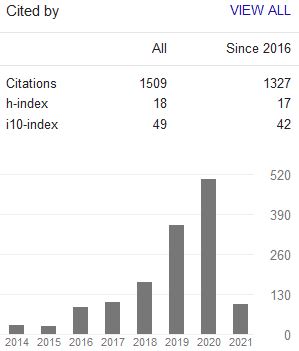THE PESANTREN-BASED RULING ELITE IN SUMENEP IN THE POST-NEW ORDER INDONESIA
Abstract
This paper discusses a dominant group in local politics of Sumenep that is based on a pesantren network that is usually referred to as the Bani Syarqawi. The author argues that the superiority of religious clerics (kyai) over the mass in Sumenep has been mainly based on their adaptability to the transformational change of their role from traditional-charismatic to rational-authoritative by means of educational excellence and genealogical network that is both powerful and full of conflict. The social significance of the superiority found its way through a social change that enabled the religious elite to be the dominant elite group in Sumenep when the power of their royal counterpart declined rapidly. Equipped with Weberian model of authority, the author argues that the formalistic tendency of elite theory can be balanced with a perspective that elite can develop and exercise power over the mass even they are outside the formal structure of politics.
Keywords
Full Text:
PDFReferences
Arslan, D. Ali. “Elite Theory Applied to Contemporary Turkish Society.” International Journal of Human Science, 2, No. 2 (2005): pp. 1-16.
Arsyi, Sitrul, et. al. Satu Abad an Nuqayah: Peran Pendidikan, Politik, Pengembangan Masyarakat. Sumenep: PP An Nuqayah, 2000.
Aspinall, Edward. Opposing Suharto: Compromise, Resistance, and Regime Change in Indonesia. California: Stanford University Press, 2005.
Bulliet, Richard W. The Case for Islamo-Christian Civilization. New York: Columbia University Press, 2004.
Burleigh, Michael. Earthly Powers: The Clash of Religion and Politics in Europe from the French Revolution to the Great War. California: Harper Collins, 2006.
Casanova, Jose. “Civil Society and Religion: Retrospective Reflections on Catholicism and Prospective Reflections on Islam.” Social Research, 68, No. 4 (2001): pp. 1041-80.
de Jonge, Huub. Madura dalam Empat Jaman. Jakarta: Gramedia, 1989.
----------. “Perkembangan Ekonomi Dan Islamisasi di Madura.” in Huub de Jonge (ed.). Agama, Kebudayaan, Dan Ekonomi: Studi-Studi Interdisipliner Tentang Masyarakat Madura. Jakarta: Rajawali Press, 1989.
Dhofier, Zamakhsyari. The Pesantren Tradition: The Role of the Kyai in the Maintenance of Traditional Islam in Java. Arizona: Program, 1999.
Effendy, Bisri. Annuqayah: Gerak Transformasi Sosial di Madura. Jakarta: P3M, 1990.
Emmerson, Donald K. Indonesia’s Elite: Political Culture and Cultural Politics. Ithaca: Cornell University Press, 1976.
Etzioni-Halevy, Eva. “Network Governance as a Challange to Democratic Elite Theory.” Paper presented at the Conference on Democratic Network Governance, Copenhagen, May 22-23, 2003.
Hague, Rod, and Martin Harrop. Comparative Government and Politics: An Introduction. 5th edition. New York: Palgrave, 2001.
Hasan, H. M. Afif. “Pola Pembangunan Masyarakat Desa Oleh Pondok Pesantren an Nuqayah.” Unpublished MA Thesis, IKIP Malang, 1995.
Hasan, Muhammad Naqib, et. al. Silsilah K.H. Moh. Syarqawi Al-Kudusi, Pendiri Pondok Pesantren an Nuqayah, Guluk-Guluk, Sumenep, Madura. Sumenep: IPBS, 1999.
Hay, Colin. Political Analysis: A Critical Introduction. New York: Palgrave, 2002.
Haynes, Jeff. Religion in Third World Politics, Issues in Third World Politics. Colorado: Lynne Rienner, 1994.
Heywood, Andrew. Politics. New York: Palgrave, 2002.
Kingsbury, Damien, and Arief Budiman (eds). Indonesia: The Uncertain Transition. Adelaide: Crawford Publishing, 2001.
Kuntowijoyo. Perubahan Sosial Dalam Masyarakat Agraris: Madura 1850-1940. Yogyakarta: originally Social change in an agrarian society: Madura, 1850-1940, Unpublished Ph.D Dissertation, Colombia University (1980), translated into Indonesian by M. Effendhie & P. Armariepuja, Mata Bangsa, 2002.
Mansurnoor, Iik A. Islam in Indonesian World: Ulama of Madura. Yogyakarta: Gadjah Mada University Press, 1990.
----------. “Rato and Kyai in Madura: Are They Twins?.” in Accross Madura Strait: The Dynamics of Insular Society, edited by Kees Van Dijk, Huub de Jonge and Elly Tpuwen-Bouwsma. Leiden: KITLLV Press, 1995.
McGibbon, Rodd. “Indonesian Politics in 2006: Stability, Compromise and Shifting Contests over Ideology.” Bulletin of Indonesian Economic Studies, 42, No. 3 (2006): pp. 321-40.
Nyman, Mikaela. Democratising Indonesia: the Challenges of Civil Society in the Era of Reformasi. Copenhagen: NIAS, 2006.
Tomsa, Dirk. “The Defeat of Centralized Paternalism: Factionalism, Assertive Regional Cadres, and the Long Fall of Golkar Chairman Akbar Tandjung.” Indonesia, 81 (2006): pp. 1-23.
Törnquist, Olle. “Dynamics of Indonesian Democratisation.” Third World Quarterly, 21, No. 3 (2000): pp. 383-423.
----------. “What’s Wrong with Indonesia’s Democratization?.” Asian Journal of Social Science, 30, No. 3 (2002): pp. 547-69.
Electronic Sources
Reynolds, H. T. “The Power Elite.” (http://www.socialstudies¬help.-com/¬APGOV_Power_Elite.htm, created 1996).
Tick, Donald. “The Rulers of Madura.” (http://www.londoh.com/-fotindo_madura_sumenep_1c.htm, created 2005).
http://www.sociosite.net/topics/weber.php
http://ssr1.¬uchi¬ca¬go.¬¬¬edu/¬¬PRELIMS¬/¬¬Theory¬/weber.html.
Newspapers
Arus Reformasi. April 5, 2000.
Bhirawa. March 3, 2005
Radar Madura. April 11, 2000.
----------. April 19, 2000.
----------. April 15, 2005.
----------. May 2, 2000.
Suara Indonesia. April 28, 2000.
----------. May 4, 2000.
Surya. April 28, 2000.
Surabaya Post. February 16, 2005.
Teropong. September 14, 2004.
Interviews
Interview with Kyai Busyro Karim.
Interview with Kyai Ramdlan Siraj.
Interviews with Kyai Rahem Usymuni
Interviews with Kyai Said Abdullah.
Interviews with Kyai Wadud Munir.
Interviews with Mawardi.
Interviews with Unais.
Interviews with Syafi’i.
Interview with Warits.
DOI: 10.15642/JIIS.2009.3.1.97-121
Refbacks
- There are currently no refbacks.
Indexed by:
Journal of Indonesian Islam (ISSN 1978-6301 and E-ISSN 2355-6994) is published by the Postgraduate Program (PPs) and the Institute for the Study of Religion and Society (LSAS), State Islamic University (UIN) of Sunan Ampel Surabaya.
Journal of Indonesian Islam by http://jiis.uinsby.ac.id/index.php/JIIs/index is licensed under a Creative Commons Attribution-ShareAlike 4.0 International License.
Copyright ©2020 State Islamic University (UIN) of Sunan Ampel Surabaya. Powered by Public Knowledge Project OJS.







